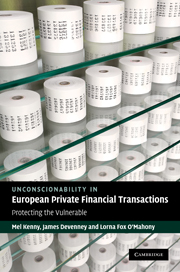Book contents
- Frontmatter
- Contents
- List of contributors
- Introduction: conceptualising unconscionability in Europe
- PART I Conceptualising unconscionability
- PART II Conceptualising unconscionability in financial transactions
- 8 Usury and the judicial regulation of financial transactions in seventeenth- and eighteenth-century England
- 9 Protection of the vulnerable in financial transactions – what the common law vitiating factors can do for you
- 10 Borrowers as consumers: new notions of unconscionability for domestic borrowers
- 11 Conceptualising and understanding fairness: lessons from and for financial services
- 12 Open the box: an exploration of the Financial Services Authority's model of fairness in consumer financial transactions
- 13 Conceptualising unconscionability in the context of risky financial transactions: how to converge public and private law approaches?
- 14 Conceptualising unconscionability in the post-Soviet era: the Lithuanian case of legal transplants
- 15 Bank loan contracts in Polish law: the legal position of the borrower
- 16 Financial contracts and ‘junk title’ purchases: a matter of (in)correct information
- 17 Kickback payments under MiFID: substantive or procedural standard of unconscionability?
- 18 Unfairness under the Consumer Protection from Unfair Trading Regulations 2008
- Conclusions
- Index
- References
18 - Unfairness under the Consumer Protection from Unfair Trading Regulations 2008
from PART II - Conceptualising unconscionability in financial transactions
Published online by Cambridge University Press: 06 August 2010
- Frontmatter
- Contents
- List of contributors
- Introduction: conceptualising unconscionability in Europe
- PART I Conceptualising unconscionability
- PART II Conceptualising unconscionability in financial transactions
- 8 Usury and the judicial regulation of financial transactions in seventeenth- and eighteenth-century England
- 9 Protection of the vulnerable in financial transactions – what the common law vitiating factors can do for you
- 10 Borrowers as consumers: new notions of unconscionability for domestic borrowers
- 11 Conceptualising and understanding fairness: lessons from and for financial services
- 12 Open the box: an exploration of the Financial Services Authority's model of fairness in consumer financial transactions
- 13 Conceptualising unconscionability in the context of risky financial transactions: how to converge public and private law approaches?
- 14 Conceptualising unconscionability in the post-Soviet era: the Lithuanian case of legal transplants
- 15 Bank loan contracts in Polish law: the legal position of the borrower
- 16 Financial contracts and ‘junk title’ purchases: a matter of (in)correct information
- 17 Kickback payments under MiFID: substantive or procedural standard of unconscionability?
- 18 Unfairness under the Consumer Protection from Unfair Trading Regulations 2008
- Conclusions
- Index
- References
Summary
Introduction
The Unfair Commercial Practices Directive (UCPD) was adopted in 2005 and requires Member States to empower bodies to take preventive action against unfair business-to-consumer practices. This has been implemented in the UK by the Consumer Protection from Unfair Trading Regulations (CPUTR) 2008, which define such practices as forms of ‘Community infringement’ under the Enterprise Act (EA), thereby providing enforcement authorities with the powers to seek enforcement orders against such practices. This now coexists with the pre-existing powers to seek enforcement orders against other practices that represent ‘Community infringements’ and those that represent ‘domestic infringements’.
This chapter considers the concept of unfairness in the CPUTR, in particular what it adds to regulatory ideas of unfairness in the financial services sector.
The regime clearly catches financial service transactions, covering commercial transactions in relation to ‘any goods or service including immovable property, rights and obligations’. Indeed, financial services transactions are given special treatment, in that they are excluded from the ‘internal market clause’, which, when applicable, will prevent Member States from exceeding the level of protection provided for in the Directive. It is expressly provided by Article 3 (9) that in relation to ‘financial services’:
Member States may impose requirements which are more restrictive or prescriptive than this Directive in the field which it approximates.
Coverage, regulatory context and the general notion of unfairness
The UCPD unfairness concept is of particular importance because of the sheer range of activities it regulates within any given transaction.
- Type
- Chapter
- Information
- Unconscionability in European Private Financial TransactionsProtecting the Vulnerable, pp. 350 - 374Publisher: Cambridge University PressPrint publication year: 2010
References
- 1
- Cited by



